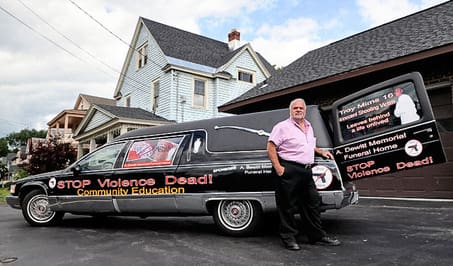“It begins in an almost innocent manner,” cbs4.com reports, leaving readers wondering how anyone rates innocence levels. “Students are called to assembly to what they think will be another speech by their principal. Instead, once seated, they will be in the center of a funeral for a ‘student’ who has been ‘the victim of violence’. Police will escort the casket to the stage where mourners will speak about a promising life cut short and warning the students that ‘this could be you’.” So much for that surprise then. You know; assuming that students at Miami Northwestern Senior High and Booker T. Washington Senior are cruising the internet rather than, I dunno, participating in the kind of gang violence that leads to real funerals . . .
Question: will there be pretend grief counselors at this thing? Just wonderin’. ”
The “This Could Be You” program was designed to dramatically drive home the consequences of violent actions. It was sparked, in part, by the recent rash of violence and deaths on South Florida campuses. During the week of May 9th, Miami-Dade County had 10-youth related shootings, some of which resulted in death.
That’s “almost” a stat! Yes, yes: if one funeral director gets to hand out cards—I mean, if one life is saved, then The Family Safety Net First Responders Service Partnership can inflict, uh, incorporate this mock funeral thing on high school curricula throughout Miami-Dade, Broward and Palm Beach. I mean, seriously. Haven’t these kids seen REAL funerals? And what did that do to stem the ride of teenage gun violence?
Related trivia: did you know that the first time the word “fuck” was broadcast was in the 1978 Peter Falk-narrated documentary Scared Straight? As for the whether or not Scared Straight or “This Could Be You” (a.k.a. “Saddened Straight”) actually achieve anything, we turn once again to the entirely objective hive mind at Wikipedia:
The effectiveness of such programs has been questioned, most significantly by a non-peer reviewed meta-analysis report of seven such programs by Anthony Petrosino et al. (2002, updated 2003), which indicated that “scared straight” programs not only failed to deter crime, but actually led to more offending behavior.




